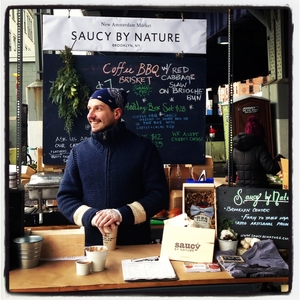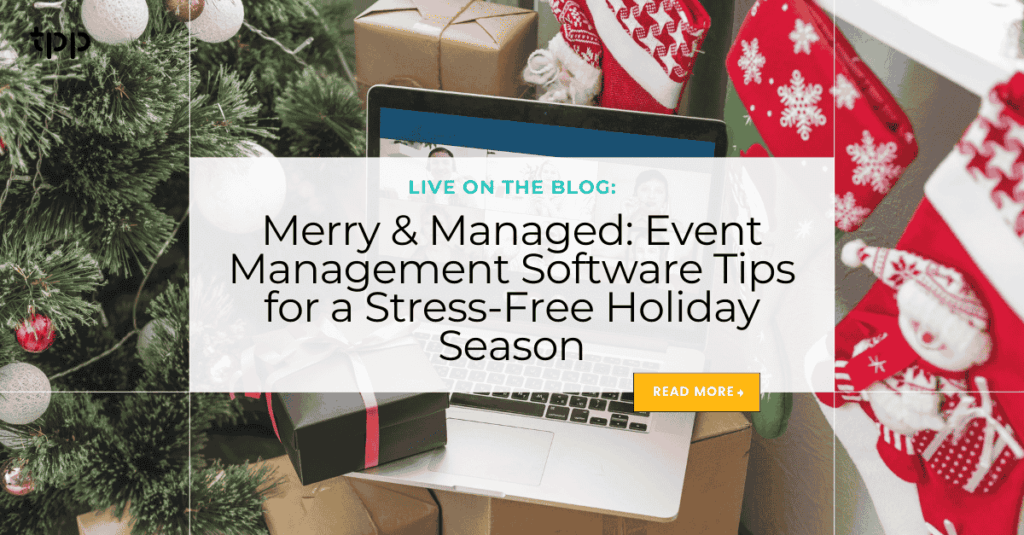In part 1 of “Can Zero Waste Initiatives Be Profitable for Caterers?”, we heard from Chowgirls Killer Catering in Minneapolis, where zero waste initiatives and sustainability are built into their business model. They’re successfully diverting 97% of their waste from landfills by doing things like getting food from local farmers and producers who deliver the food in reusable food packaging, using eco-friendly containers for serving food, composting, and recycling as much as they can, including aluminum, paper, plastics, and spent grease. Best of all, they’re finding it’s good for the bottom line!
Another caterer in Brooklyn has sustainability on his mind, too. Przemek Adolf owns Saucy By Nature. In addition to trying to compost and recycle as much as he can, he created a small restaurant where he can serve surplus food from catering gigs.
“I never set out to have a restaurant. I really just wanted to focus on catering,” Przemek told Total Party Planner. “But the opportunity just sort of presented itself. I try to order in bulk to save  money, but that doesn’t always work out,” he explains. “Unless different events use the same ingredients, stuff goes bad before I can use it, and it gets thrown out. So, then I’ve wasted money and it’s bad for the environment. So, having a restaurant lets us use our surplus food more responsibly and creates an additional revenue stream.”
money, but that doesn’t always work out,” he explains. “Unless different events use the same ingredients, stuff goes bad before I can use it, and it gets thrown out. So, then I’ve wasted money and it’s bad for the environment. So, having a restaurant lets us use our surplus food more responsibly and creates an additional revenue stream.”
From the beginning, part of Przemek’s business model has been to partner with local distributors who have ethics and zero waste and sustainability goals that are similar to his own. He’s always used local, fresh ingredients for his menus, which is something that was ingrained in him while traveling through Asia and living in Europe. “I traveled, visited markets, tried local cuisine. Eating local is a way of life everywhere else. It’s a given. It’s normal. It’s the standard, not just something for the elite,” he says.
When he was ready to get his own commercial catering space, he didn’t have investors. He had to raise the cash himself, which meant saving money wherever he could. Reducing waste and finding sustainable ways to do business actually saved him money in the long run and made it possible for him to save up the capital he needed.
Real estate in New York City is complex, to say the least. In setting up a kitchen, Przemek found himself having to deal with the fire department, the Department of Health, and the Department of Consumer Affairs, to name just some of the bureaucracy he was dealing with. And then there’s the fact that the real estate market there is very tight. Finding something convenient and affordable is a challenge.
After searching for eight months, he found the right space for his catering company, and it happened to include restaurant space. That’s how the idea to create a local cafe with a rotating menu using leftover ingredients from his events was born! He also sells condiments and sauces from his cafe (although that does add to the bureaucracy he deals with, since the Department of Agriculture regulates food consumed off premises, such as his condiments, and the Department of Health regulates food consumed on premises).
But Przemek hasn’t stopped there. He works with a waste management consultant to put into place a three-tier approach to reducing waste:
 Composting and recycling
Composting and recycling- Using resources (such as ingredients) as wisely as possible to avoid waste, including serving in his cafe surplus ingredients that would otherwise be thrown out
- In the future, serving, donating, or selling actual leftovers from events to reduce food waste even further
Today, Przemek produces less than one bag of trash per week from his cafe! He also uses fresh, untouched leftover ingredients to create new entrees and meals for the cafe. However, at some point, he thinks it would be good to be able to serve actual leftovers that for now are thrown away as compost or trash.
Depending on where a business is located, there are places, such as food banks, that can pick up leftover food from events and redistribute it to people in the local community who need it most. For example, in the Portland, Oregon area, there’s ForkItOver.org, which also has great articles and resources on its site.
On a national level, there’s the Food Donation Connection, which works in partnership with the National Restaurant Association to provide “an alternative to discarding surplus wholesome food by linking food service donors with surplus food to local hunger relief agencies.” However, there are many challenges to salvaging leftovers. Businesses and charities have to be mindful of transportation and storage in order to comply with food safety regulations. Timing is critical, too, since freshly prepared food has a shelf life and must be stored properly.
“There’s a lot of dialogue about food waste,” Przemek says, “but where are the solutions coming from? Our business has slim margins, as many caterers do. So, even if we want to save the food to donate it, who will refrigerate and store the food? There is a cost for energy and labor to store the food, and that’s particularly high in New York. So, how do I get this food into other people’s hands in a way that is fiscally sustainable for me and the non-profit?”
Living in a big, complex city like New York has its own special set of challenges. Unlike Minneapolis, where the mayor is getting the city on track to be a zero-waste city, New York doesn’t compost. It did offer composting at one point as a pilot program, but the facility where the organic waste was processed was shut down in November 2014, according to this article by WNYC, and now the compost goes to a landfill. There are residential trash and recycling curbside programs, but as a commercial business, Przemek has to pay a private company to take his trash and recycling. Even with that, he’s had problems with this current company not taking his recycling.
Despite some of the challenges and setbacks, Przemek remains optimistic and is always looking for new ways to reduce waste. Before he became a caterer, he studied sustainable economics, so he’s intimately familiar with what’s at stake. “We take waste management for granted,” Przemek explains. “The cost of waste management is eventually going to cost more in the future. Fixing an ecosystem or figuring out where to put waste, we’re just deferring the cost for a later time. That’s not going to work either.”
When asked what advice he has for other caterers and restaurants who want to reduce waste and look for more sustainable ways of doing business, he recommends looking at what you’re trying to do and developing systems around the things that are both profitable and ethical.
For example, what is the cost of a few compostable or recyclable cups and plates and paying a service to process them compared to the cost of the labor, water, and energy to wash reusable utensils? Which system makes more sense financially to set up in the long run?
And for people who say, “Well, the cheap non-recyclable plastic utensils are cheapest in the long run,” remember that one must factor in the trash bill. Depending on what your arrangements are with your waste management company, if you’re able to reduce your waste, can you reduce your trash bill, too? Can you reduce dumpster pick-up to every other week? Once a month?
As the cost of waste rises and the U.S. runs out of landfills, the cost of waste management is going to go up, too. So even if you don’t pay for those extra plastics now, we’re all likely to see the price of disposing of them go up in the future.
Przemek for one seems energized every time he discovers a new solution to everyday waste problems. He encourages owners to look for their own creative solutions to using resources more wisely and reducing waste.
For him, as he started this new venture, there were a lot of things he didn’t know about yet, so it’s been a constant learning process. He’s been able to grow and succeed, step by step. He’s constantly reassessing his situation, thinking through things. “It’s important to work hard,” says, Przemek, “but think harder. And don’t give up. Success comes through tenacity. It takes a lot to get an idea off the ground sometimes. Be prepared for that. There will be great days and terrible days, but don’t give up.”
The good news for catering companies is that no matter where you live, sustainability is a big buzzword right now. If you look up waste management and zero waste resources in your community, you’re likely to find different initiatives that you can research to see if they’ll fit in with your business model.
Ready for more ideas that you can take action on in your own business? In part 3 of “Can Zero Waste Initiatives Be Profitable for Caterers?”, we’ll take a look at ideas – big and small – that can add up to less waste and more savings. And you’ll be surprised at how easy some of them are to implement.
Ready to be inspired and informed? For the latest in catering industry news and trends and small business marketing, join the conversation on social media. Follow TPPSoftware on Twitter, like Total Party Planner on Facebook, and explore our boards on Pinterest.
Want to get advice from other caterers and find out how they do things? Join the conversation with #CaterQuest on Twitter!






